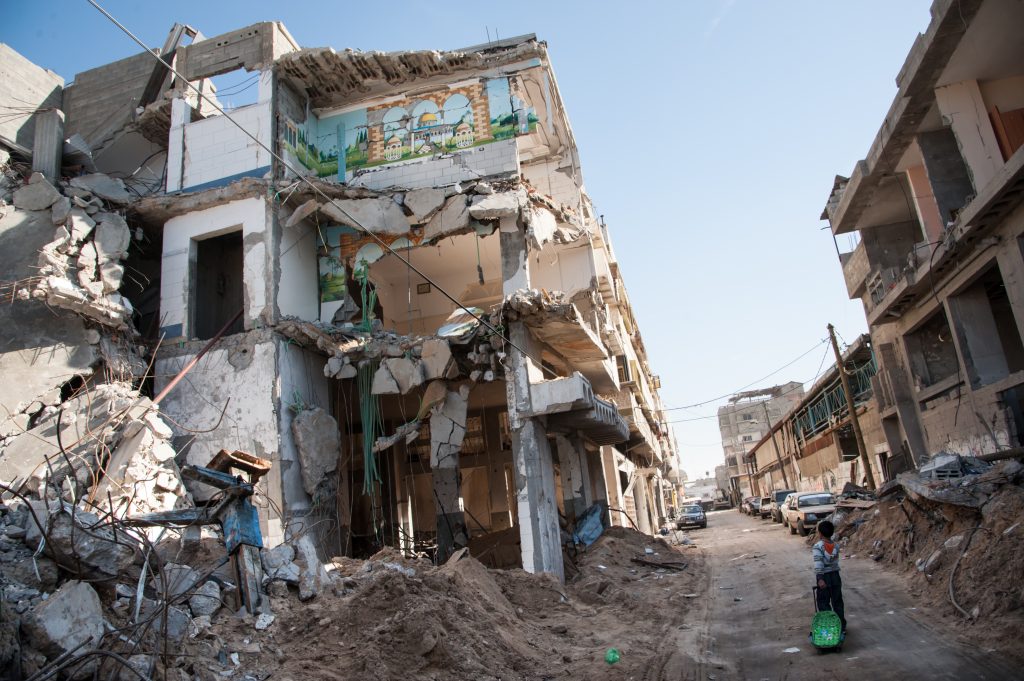It is time to speak of humanitarian aid in a clear manner which recognises this strategy as humanitarian warfare.
It is time to speak of humanitarian aid in a clear manner which recognises this strategy as humanitarian warfare.
In recent months, Gaza’s humanitarian situation has been under intense, albeit useless scrutiny. There is no disagreement that deprivation has reached unprecedented levels. Yet this consensus was also the product of an international effort that supports the Palestinian Authority (PA) regaining complete control over Gaza. In the words of UN Special Coordinator Jamie McGoldrick, the PA “would make our job easier, and hopefully create an atmosphere where people can see hope”. This is despite the fact that even from a distance, the PA has only increased hardships for Palestinians in Gaza by imposing sanctions that have contributed to the enclave’s decline.
Only mere days prior to Israel’s latest bombing of Gaza, Qatar sent $15 million in cash to pay the salaries of Palestinian civil servants. Over the next six months, $90 million will be distributed in Gaza. Mainstream media has lauded the cash infusion as a necessary respite. And according to Qatar, 27,000 civil servants out of 40,000 will benefit from the donated funds.
However, there is no doubt that the political game to keep Palestinians in Gaza hovering between life and death is set to continue.
Within the Arab world, there is no commitment towards the Palestinian struggle, and this is not just because the Arab Spring has left repercussions and opportunities for foreign interference with blurring allegiances. Diplomatic ties to Israel have always been favoured by the Arab world, while the Palestinian anti-colonial struggle is exploited as an ostensibly unifying factor. The reality is, however, that the Arab countries’ consideration of Palestine is a farce – it provides a rallying point for slogans and meetings, while being swiftly dismissed until the next occasion.
Qatar’s cash may well provide a temporary alleviation for Palestinians in Gaza, yet the nature of donations confirms the Palestinians’ disappearance from political autonomy. It is Israel that decided, out of its own strategic interests, to allow the funds to reach Gaza, at a time when discourse about deprivation had reached unprecedented levels. There is no doubt that Qatar’s donation will do nothing other than to satisfy the immediate needs of Palestinian families, even as other necessities such as the access to uninterrupted health services, clean water and freedom of movement remain non-existent.

It is of no use to speak of universal rights when these very rights are politicised and bequeathed according to hegemonic interests.
The humanitarian context is providing a political framework for the actors determining Gaza’s survival or destruction. It is also constructing a misleading – and indeed, fabricated narrative – about Gaza, that portrays donor aid as the only solution for Palestinians in the enclave. This dissemination, promoted by the international community at the behest of Israel and the PA, is leading to stagnated discussions of humanitarian aid while knowing full well that the violations as a result of colonial collusion have exceeded any pledged or donated funds.
Additionally, the separation of politics from the people is contributing to a situation where the Palestinian people are associated with aid, and the politics are attributed to Hamas.
This erroneous distinction is also applied on a broader level where the political actors involved in decision-making are pushing both entities into a vacuum – the people divested of their political rights, while Hamas is internationally isolated in terms of diplomatic engagement. It is not enough to argue that there are a few countries that engage with Hamas; the discrepancy lies in the fact that these countries are still politically engaged at an international level. Hence, any relations with Hamas are still determined, in terms of priorities, according to what is deemed acceptable by the international community.
The collective decision to force Palestinian lives into being inherently dependent upon humanitarian aid and financial support reflects a widespread and irreversible refusal to engage politically over Israel’s colonial violence and the PA’s collaboration. In terms of the harm inflicted upon Palestinians due to the refusal of the international community to recognise the Palestinian people’s political aspirations, it is time to speak of humanitarian aid in a clear manner which recognises this strategy as humanitarian warfare.





